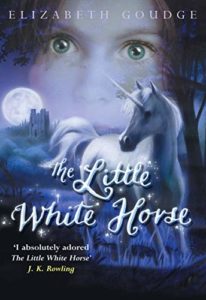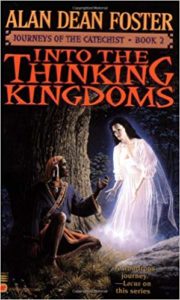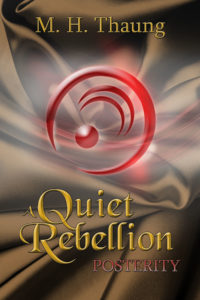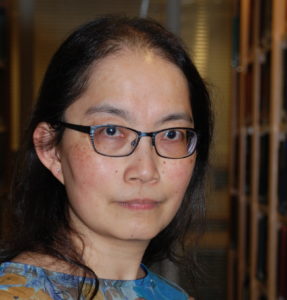Say hello to M.H.! She responded to my call for speculative fiction interview participants last week, and I’m excited to share her answers with you today.
 What was the first speculative story you ever remember reading?
What was the first speculative story you ever remember reading?
The Little White Horse, by Elizabeth Goudge. I’m really showing my age here – must have been about six at the time. A year or two after that, my parents took me somewhere on the train without a ticket (in those days, under-5s travelled for free), but the ticket inspector caught me reading Alice in Wonderland.
Who is your favourite author? Why?
Oof, that’s a tough decision. I’d say Terry Pratchett overall since he wrote so many books, and I can pick one that matches my reading mood. I enjoy him not so much for his humour, but because of his insight into how people behave. All his people are believable people, as well as being vampires, trolls and so on. Roger Zelazny is also high on my fantasy author list. In contrast to Pratchett, it’s because his larger than life characters appeal to me.
What do you like most about the genre(s) you read?
I dip into various speculative genres – SF (on the soft side), alternate history, urban fantasy, low fantasy. There are common aspects to all of them. I like seeing the knock-on effects of whatever is different in that world taken to some logical conclusion. That is, “the different thing” isn’t just cosmetic – it affects the story.
More and more authors seem to be writing cross-genre stories these days. How do you feel about this trend?
It’s not always easy to place a book into a genre (I have this problem with my own writing). I like the idea of experimenting – a bit like fusion restaurants – but you’d need to try a specific combination before deciding if you liked it or not. Something to save for when you’re feeling adventurous, maybe. Given how many books are available, there’s scope for all tastes to be catered to, whether meat and two veg or a combination of eclectic ingredients from five continents. Ok, I’ll stop with the food comparisons now!
If you could name a pet after one character, which character would you choose? Why?
If I had a pet, I might call it Esme (Weatherwax). Why? So I could talk to it and imagine it giving me pithy, unsentimental advice on life in return.
What fictional world would you never want to visit?
Arrakis. Doesn’t seem like a friendly place at all!
 What fictional world would you want to visit?
What fictional world would you want to visit?
Assuming personal safety wasn’t an issue, I’d like to explore the world of Alan Dean Foster’s Journeys of the Catechist series. It wasn’t the most interesting story I’ve ever read (and I’m sure it’s horribly dated by now), but my curiosity was sparked by the different locations the adventurers pass through.
Sharing spoilers with people who haven’t read the book or seen the film/show is a hot topic on Twitter and across many fandoms. How do you feel about sharing or overhearing spoilers?
I don’t share spoilers since 1. it annoys some people, 2. it feels like there’s little point in talking about a book if your conversation partner hasn’t read it already and 3. I know very few people in real life with similar reading interests to mine. However, I’m not bothered by overhearing spoilers. This might be partly because I only read: I don’t watch TV or films, and it feels like books prompt less discussion in general.
Bonus Questions
What is the most unusual or interesting way you’ve come up with an idea for one of your creative works?
 I don’t think any of my story ideas have had unusual sources of inspiration. Random generators are pretty helpful – cards and lists that you might use in RPGs or collaborative storytelling.
I don’t think any of my story ideas have had unusual sources of inspiration. Random generators are pretty helpful – cards and lists that you might use in RPGs or collaborative storytelling.
Sometimes characters don’t do what their creators want them to do. If this has ever happened to you, how did you deal with it?
I love it when my characters start wanting to do their own thing, but I still tell them I’m in charge. It’s not always that easy! There was one specific incident when I was writing A Quiet Rebellion: Posterity. It’s the final book in my trilogy, so I knew the characters pretty well by that point. One character woke me up and told me she was going to kidnap another character. It complicated the plot wonderfully, and (I hope) got me out of a mid-story slump.
What is your favourite trope?
Not exactly a trope, but I love dramatic irony and my characters (most of whom are supposed to be on the same side) getting in each other’s way, with the best of intentions.
What tropes do you try to avoid in your stories?
I’m not terribly keen on grand, pre-ordained fates or saving the world. My characters might want to save their little part of the world, but their concerns are largely personal.
 About M.H.: M. H. Thaung is a pathologist working in a laboratory in London, UK. It’s been over ten years since she cut up a dead body. She started writing for fun about four years ago, and since then it’s turned into an obsession—er, major hobby. She recently released A Quiet Rebellion: Posterity, the final book in her SF adventure/mannerpunk trilogy.
About M.H.: M. H. Thaung is a pathologist working in a laboratory in London, UK. It’s been over ten years since she cut up a dead body. She started writing for fun about four years ago, and since then it’s turned into an obsession—er, major hobby. She recently released A Quiet Rebellion: Posterity, the final book in her SF adventure/mannerpunk trilogy.
Terry Pratchett fans may be particularly interested in M.H.’s interview with Stephen Briggs.

I find it interesting how many bloggers rank Terry Pratchett high on their list. I hadn’t thought of Zelazny in some time. Need to re-read some of his work. Same with Allan Dean Foster.
Yeah, that is something that keeps coming up with these interviews. Very cool.
I’ve never read Allan Dean Foster or Zelazny. I’ll need to change that sometime.
Maybe Pratchett’s universal appeal is his insight into “the human condition” without the cynicism of, say, Douglas Adams. I’m not sure how well Foster’s earlier works have aged, but I still find Zelazny’s very rereadable.
Cool. 🙂